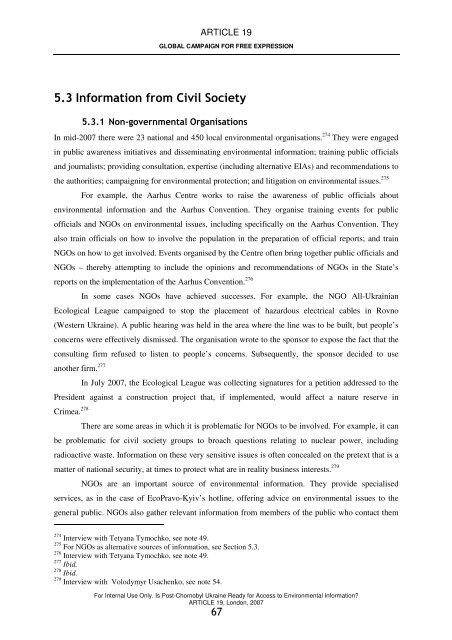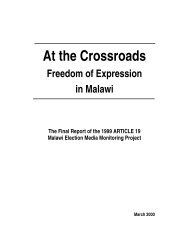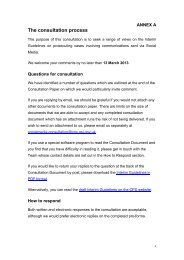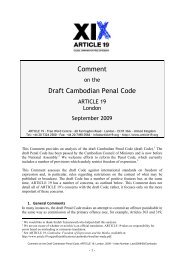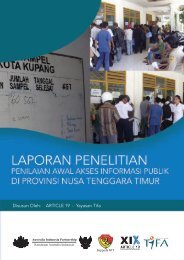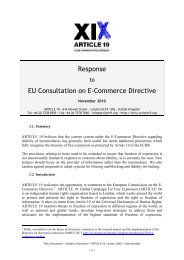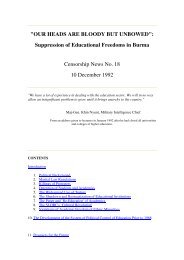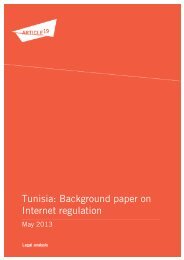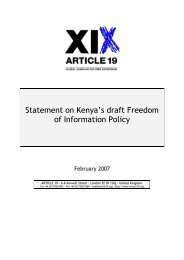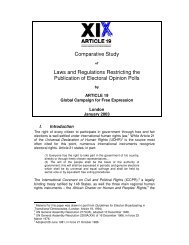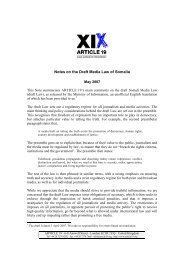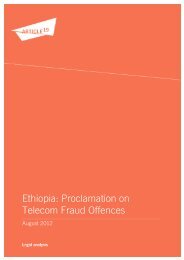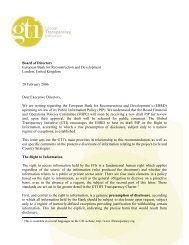ARTICLE <strong>19</strong>GLOBAL CAMPAIGN <strong>FOR</strong> FREE EXPRESSIONprocess, the PACE called on Ukraine ‘to launch the reform of the criminal justice system and lawenforcementagencies and to take legislative and practical measures to tackle all forms of corruption,including political corruption’. 268Allowing information related to mismanagement and corruption to reach the public domaincould lead to the authorities being called to account on issues such as budget expenditure onenvironmental projects. 269 For example, the MEP has stated that it has been able to raise itsenvironmental fund (from the equivalent of approximately US$800,000 in 2006 to US$1 million in2007). These funds are largely derived from the use of natural resources. 270 The relationship betweenthe size of the budget and the state of the environment is, therefore, inversely proportional; an increasein funds means increasing exploitation of natural resources. 271 However, reportedly some of the moneyraised for the fund (or that should have been included in the fund) has not been accounted for. 272In 2004 a high profile public official in the MEP was reportedly involved in a corruptionscandal related to a tender for 400,000 Ukrainian hryvnia (approximately US$80,000) for thereconstruction of Crimean parks. According to evidence presented to the prosecutor, there were threeapplicants for the tender, but all had the same address. An environmental journalist examined theparks that should have been ‘reconstructed’, but could find no evidence that this work had been carriedout. When the journalist started reporting on the case, he received telephone calls from a publicofficial threatening legal action. Although no lawsuit was filed, and the journalist felt confident that hecould prove his statements in court, this put considerable pressure on him. Following the scandal therewere demonstrations and civil society campaigns calling for the public official’s resignation; theofficial was eventually dismissed. 273In some cases, public officials have been silenced. In one case, nuclear waste from a militarybase in Chernihiv was transported to another site in absolute secrecy. An MP at the time had indirectlylearned about this. When he started talking about the case publicly, a colonel from State SecurityServices visited him and warned him of the consequences of ‘disclosing official secrets’. The formerparliamentarian maintained that, in his opinion, the reason for the secrecy was not military security butfinancial gain and possible corruption. Indeed, activities related to nuclear or toxic waste are often alsoofficially declared to be ‘commercial secrets’.268 PACE Resolution 1549 (2007) ‘Functioning of Democratic Institutions in Ukraine’, Point 15.6; adopted <strong>19</strong>April 2007, http://assembly.coe.int/Main.asp?link=/Documents/AdoptedText/ta07/ERES1549.htm269 Interview with Ukrainian environmental organisations, July 2007.270 There are also some charitable funds in addition.271 Furthermore, construction companies have to pay additional fees for each venture that has a negative impacton the environment – the bigger the fee the bigger the impact. Fees are also paid for hunting.272 Interview with Borys Vasylkivskyy, EcoPravo-Kyiv, see note 212.273 Interview with Oleg Listopad, see note 82.For Internal Use Only. Is Post-Chornobyl Ukraine Ready for Access to Environmental Information?ARTICLE <strong>19</strong>, London, 2007''
ARTICLE <strong>19</strong>GLOBAL CAMPAIGN <strong>FOR</strong> FREE EXPRESSION9,3 " " ! 9,3,* .!" .In mid-2007 there were 23 national and 450 local environmental organisations. 274 They were engagedin public awareness initiatives and disseminating environmental information; training public officialsand journalists; providing consultation, expertise (including alternative EIAs) and recommendations tothe authorities; campaigning for environmental protection; and litigation on environmental issues. 275For example, the Aarhus Centre works to raise the awareness of public officials aboutenvironmental information and the Aarhus Convention. They organise training events for publicofficials and NGOs on environmental issues, including specifically on the Aarhus Convention. Theyalso train officials on how to involve the population in the preparation of official reports; and trainNGOs on how to get involved. Events organised by the Centre often bring together public officials andNGOs – thereby attempting to include the opinions and recommendations of NGOs in the State’sreports on the implementation of the Aarhus Convention. 276In some cases NGOs have achieved successes. For example, the NGO All-UkrainianEcological League campaigned to stop the placement of hazardous electrical cables in Rovno(Western Ukraine). A public hearing was held in the area where the line was to be built, but people’sconcerns were effectively dismissed. The organisation wrote to the sponsor to expose the fact that theconsulting firm refused to listen to people’s concerns. Subsequently, the sponsor decided to useanother firm. 277In July 2007, the Ecological League was collecting signatures for a petition addressed to thePresident against a construction project that, if implemented, would affect a nature reserve inCrimea. 278There are some areas in which it is problematic for NGOs to be involved. For example, it canbe problematic for civil society groups to broach questions relating to nuclear power, includingradioactive waste. Information on these very sensitive issues is often concealed on the pretext that is amatter of national security, at times to protect what are in reality business interests. 279NGOs are an important source of environmental information. They provide specialisedservices, as in the case of EcoPravo-Kyiv’s hotline, offering advice on environmental issues to thegeneral public. NGOs also gather relevant information from members of the public who contact them274 Interview with Tetyana Tymochko, see note 49.275 For NGOs as alternative sources of information, see Section 5.3.276 Interview with Tetyana Tymochko, see note 49.277 Ibid.278 Ibid.279 Interview with Volodymyr Usachenko, see note 54.For Internal Use Only. Is Post-Chornobyl Ukraine Ready for Access to Environmental Information?ARTICLE <strong>19</strong>, London, 2007'(


